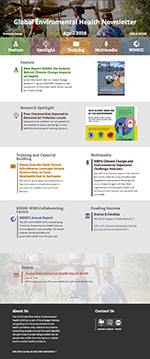
Mission Statement
Climate Change and Human Health Literature Portal
Explore the Climate Change and Human Health Literature Portal
The NIEHS vision, presented in the Strategic Plan for 2018-2023, is to provide “global leadership for innovative research that improves public health by preventing disease and disability.”
NIEHS identifies Global Environmental Health (GEH) as a part of its strategic themes, recognizing that because environmental health problems cross national boundaries, conducting studies around the world benefits not just those in areas being studied, but all people who suffer from the same or related environmental health problems. The inclusion of GEH continues a tradition of NIEHS global leadership and collaboration on solving the most pressing environmental health problems and improving the lives of the most vulnerable populations, both in the United States and around the world.
Global Environmental Health may be defined as:
Research, education, training, and research translation directed at health problems that are related to environmental exposures and transcend national boundaries, with a goal of improving health for all people by reducing the environmental exposures that lead to avoidable disease, disabilities and deaths.
Goals
The Global Environmental Health Program assists NIEHS in achieving its goals in three areas:
Global Environmental Health Research:
Public health improvements must be based on solid scientific understanding of population exposures and their effects. NIEHS, through its global research on health effects and exposure assessment, increases scientific knowledge and understanding of both adverse and beneficial health effects from environmental conditions, with special emphasis on effects on populations in low- and middle-income countries.
Global Environmental Health Translation:
Advances in scientific knowledge must be translated into information that leaders, decision makers, and individuals can understand and use to inform the design and implementation of health protection and promotion actions. NIEHS, through its research translation and outreach activities, aims to improve understanding of global environmental health issues in key target audiences.
Global Environmental Health Scientific Capacity:
NIEHS continues a decades-long commitment to improving the ability of countries around the world to study and solve their specific environmental health problems. We do this by supporting the training of international scientists, both on our campus and around the world; partnering with institutions in other countries to share expertise and maximize resources; and working to improve the scientific knowledge base in other countries by disseminating scientific information on environmental health where the burden of environmental disease is greatest.
Special Topics
NIEHS supports research, research translation, and capacity building in three special topics relevant to Global Environmental Health. For more information, click the links below:
Newsletter
This bimonthly online newsletter provides a snapshot of NIEHS's current GEH activities, profiles of areas of GEH research, funding information, and useful resources. By partnering with the global health and global environmental communities, in part through information exchanges like this newsletter, NIEHS hopes to build the collaborations that will lead to effective disease prevention and health promotion around the world.
NIEHS-WHO Collaborating Centre for Environmental Health Sciences
Many of NIEHS's Global Environmental Health activities are coordinated by the NIEHS-WHO Collaborating Centre for Environmental Health Sciences. Designated in September, 2013, the Collaborating Centre is a central part of the institute's vision to provide global leadership on environmental health issues.
Contacts
-

-
John Balbus, M.D., M.P.H.
Senior Advisor for Public Health
Director, NIEHS-WHO Collaborating Centre for Environmental Health Sciences -
Tel 301-496-3511
Fax 301-496-0563
john.balbus@nih.gov -
31 Center Dr
Claude D Pepper Building
Bethesda, MD 20892
-

-
Trisha M. Castranio
Program Manager -
Tel 984-287-3245
castran1@niehs.nih.gov -
P.O. Box 12233Mail Drop K3-02Durham, N.C. 27709
-

-
Ann Liu, Ph.D., M.P.H.
Contractor — Senior Scientist -
Tel 301-496-3511
ann.liu@nih.gov -
31 Center Dr
Claude D Pepper Building
Bethesda, MD 20892
- Email: NIEHSGEH@mail.nih.gov
NIEHS Global Environmental Health Program Steering Committee
-

-
Stephanie J. London, M.D., Dr.P.H.
Deputy Chief, Epidemiology Branch and Senior Investigator -
Tel 984-287-3688
Fax 301-480-3290
london2@niehs.nih.gov
-

-
Kimberly Thigpen Tart, J.D., M.P.H.
Health Science Policy Analyst -
Tel 984-287-3326
kimberly.thigpentart@nih.gov
-

-
Claudia Thompson, Ph.D.
Branch Chief, Population Health Branch -
Tel 984-287-3330
Fax 919-541-4937
thompso1@niehs.nih.gov
-

-
Mary S. Wolfe, Ph.D.
Deputy Division Director for Policy, Director, Office of Liaison, Policy, and Review -
Tel 984-287-3209
Fax 301-451-5759
wolfe@niehs.nih.gov
Related Links
NIEHS Related Links
- Climate Change
- Climate Change and Human Health Lesson Plans
- Collaboration between the World Health Organization and the National Institute of Environmental Health Sciences: Highlights from 30 years of Partnership (1MB)
- Global Development Goals and Links to Sustainability and Health Workshop Summary
- Harmful Algal Blooms
- NIH Disaster Research Response (DR2)
- Support for International Scientists
NIH/HHS Related Links
- Climate and Health
- Climate Change and Human Health
- Fogarty International Center
- Global Environmental and Occupational Health (GEOHealth)
- Global Health Protection and Security
Other US Government Global Health Links
- Environmental Health
- Interagency Crosscutting Group on Climate Change and Human Health
- National Integrated Heat Health Information System
- USAID Bureau of Global Health
International Global Health Links
to Top



